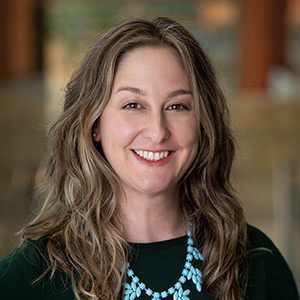The research community at the Institute includes visiting scholars, consultants, economists, research analysts, and research assistants. These scholars bring a diversity of backgrounds, interests, and expertise to research that deepens our understanding of economic opportunity and inclusion as well as policies that work to improve both.
Visiting scholar Laura Gee works to connect real-world practitioners with her insights about gender differences in the labor market using communication skills she has forged in the classroom, in the conference hall, and on the stage.
Gee first discovered her love of problem-solving and math in high school, and an economics prerequisite at Barnard College made her path clear. “It just spoke to me in a way that no other discipline ever had,” said Gee. “I always liked math, but I felt like it could be very abstract, and this really made it, like, math with purpose.”
As a behavioral economist, she is drawn to the questions that pick up where basic economic models fail to predict human behavior. “Where does it feel like people are making bad decisions from a very basic perspective, but that if we better understood what was driving their decisions, we would see that they’re actually making the right decision in the context that they’re living in?”
Gee first focused her research on why people give to public goods like charities, schools, or parks. But when she became a mother, she said her research shifted to understanding the different experiences of men and women that she saw all around her.
In recent research, Gee and her co-authors, Kristy Buzard and Olga Stoddard (both also visiting scholars), documented in an experiment what many parents have observed first-hand: When an educator needed to get in touch with a two-parent, heterosexual household, even when told the father was more available, mothers were still contacted 26 percent of the time. Her research found that communication signals could shift some, but not all, of the contact from mothers to fathers, giving educators and administrators new information to consider when crafting policy.
Gee has also taken the stage at TEDxCambridge to talk about her research on ways to increase workforce diversity. In a partnership with LinkedIn, Gee found that providing a single, simple piece of information, the number of applicants for a job posting, could help firms successfully attract more female applicants. That TEDx talk led to more speaking opportunities outside of academia, including human resources conferences.
“I really prioritize not just giving seminars and talking with other economics departments but also talking to practitioners,” said Gee. “I want the findings from this work to percolate out and make changes in the real world.”







